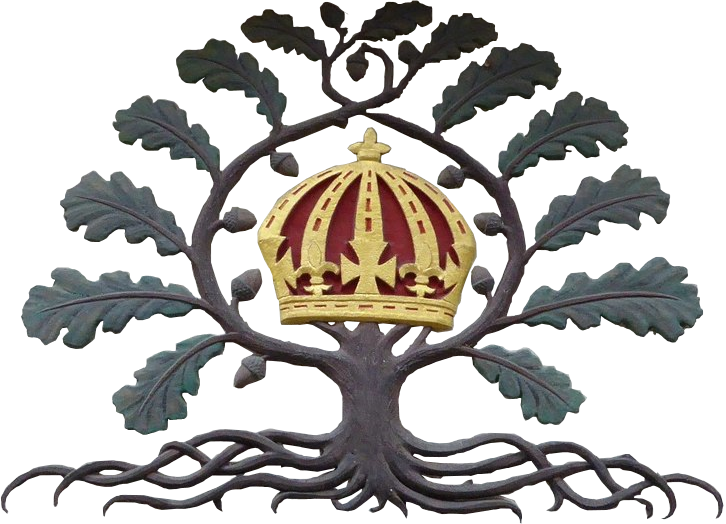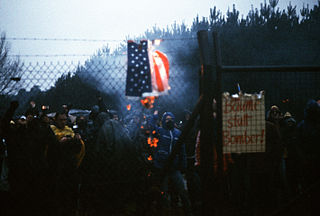Related Research Articles
A commonwealth is a traditional English term for a political community founded for the common good. Historically it has sometimes been synonymous with "republic". The noun "commonwealth", meaning "public welfare, general good or advantage", dates from the 15th century. Originally a phrase it comes from the old meaning of "wealth", which is "well-being", and is itself a loose translation of the Latin res publica (republic). The term literally meant "common well-being". In the 17th century, the definition of "commonwealth" expanded from its original sense of "public welfare" or "commonweal" to mean "a state in which the supreme power is vested in the people; a republic or democratic state".
Libertarian socialism, also referred to as anarcho-socialism, anarchist socialism, free socialism, stateless socialism, socialist anarchism and socialist libertarianism, is an anti-authoritarian, anti-statist and libertarian political philosophy within the socialist movement which rejects the state socialist conception of socialism as a statist form where the state retains centralized control of the economy. Overlapping with anarchism and libertarianism, libertarian socialists criticize wage slavery relationships within the workplace, emphasizing workers' self-management and decentralized structures of political organization. As a broad socialist tradition and movement, libertarian socialism includes anarchist, Marxist and anarchist or Marxist-inspired thought as well as other left-libertarian tendencies. Anarchism and libertarian Marxism are the main currents of libertarian socialism.
Political correctness is a term used to describe language, policies, or measures that are intended to avoid offense or disadvantage to members of particular groups in society. In public discourse and the media, the term is generally used as a pejorative with an implication that these policies are excessive or unwarranted. Since the late 1980s, the term has been used to describe a preference for inclusive language and avoidance of language or behavior that can be seen as excluding, marginalizing, or insulting to groups of people disadvantaged or discriminated against, particularly groups defined by ethnicity, sex, gender, or sexual orientation.

A Tory is a person who holds a political philosophy known as Toryism, based on a British version of traditionalism and conservatism, which upholds the supremacy of social order as it has evolved in the English culture throughout history. The Tory ethos has been summed up with the phrase "God, Queen, and Country". Tories are generally monarchists, were historically of a high church Anglican religious heritage, and opposed to the liberalism of the Whig faction. Typically, Tories defend the ideas of hierarchy, natural order, and aristocracy.
Wage slavery is a term used to describe a situation where a person's livelihood depends on wages or a salary, especially when the wages are low and person has few realistic chances of upward mobility.
Right-wing politics supports the view that certain social orders and hierarchies are inevitable, natural, normal, or desirable, typically supporting this position on the basis of natural law, economics, or tradition. Hierarchy and inequality may be seen as natural results of traditional social differences or competition in market economies.

The military–industrial complex (MIC) describes the relationship between a nation's military and the defense industry that supplies it, seen together as a vested interest which influences public policy. A driving factor behind this relationship between the government and defense-minded corporations is that both sides benefit—one side from obtaining war weapons, and the other from being paid to supply them. The term is most often used in reference to the system behind the military of the United States, where it is most prevalent due to close links between defense contractors, the Pentagon and politicians and gained popularity after a warning of its detrimental effects in the farewell address of President Dwight D. Eisenhower on January 17, 1961.
The propaganda model is a conceptual model in political economy advanced by Edward S. Herman and Noam Chomsky to explain how propaganda and systemic biases function in corporate mass media. The model seeks to explain how populations are manipulated and how consent for economic, social, and political policies, both foreign and domestic, is "manufactured" in the public mind due to this propaganda. The theory posits that the way in which corporate media is structured creates an inherent conflict of interest and therefore acts as propaganda for anti-democratic elements.

Hegemony or Survival: America's Quest for Global Dominance is a study of the American empire written by the American linguist and political activist Noam Chomsky, a professor at the Massachusetts Institute of Technology. It was first published in the United States in November 2003 by Metropolitan Books and then in the United Kingdom by Penguin Books.
The nature of capitalism is criticized by anarchists, who reject hierarchy and advocate stateless societies based on non-hierarchical voluntary associations. Anarchism is generally defined as the libertarian philosophy which holds the state to be undesirable, unnecessary and harmful as well as opposing authoritarianism, illegitimate authority and hierarchical organization in the conduct of human relations. Capitalism is generally considered by scholars to be an economic system that includes private ownership of the means of production, creation of goods or services for profit or income, the accumulation of capital, competitive markets, voluntary exchange and wage labor which has generally been opposed by anarchists historically. Since capitalism is variously defined by sources and there is no general consensus among scholars on the definition nor on how the term should be used as a historical category, the designation is applied to a variety of historical cases, varying in time, geography, politics and culture.
Left-libertarianism, also known as egalitarian libertarianism, left-wing libertarianism or social libertarianism, is a political philosophy and type of libertarianism that stresses both individual freedom and social equality. Left-libertarianism represents several related yet distinct approaches to political and social theory. In its classical usage, it refers to anti-authoritarian varieties of left-wing politics such as anarchism, especially social anarchism, whose adherents simply call it libertarianism. In the United States, it represents the left-wing of the libertarian movement and the political positions associated with academic philosophers Hillel Steiner, Philippe Van Parijs and Peter Vallentyne that combine self-ownership with an egalitarian approach to natural resources. This is done to distinguish libertarian views on the nature of property and capital, usually along left–right or socialist–capitalist lines.
Libertarianism is a political philosophy and movement that upholds liberty as a core principle. Libertarians seek to maximize autonomy and political freedom, emphasizing free association, freedom of choice, individualism and voluntary association. Libertarians share a skepticism of authority and state power, but some libertarians diverge on the scope of their opposition to existing economic and political systems. Various schools of libertarian thought offer a range of views regarding the legitimate functions of state and private power, often calling for the restriction or dissolution of coercive social institutions. Different categorizations have been used to distinguish various forms of libertarianism. Scholars distinguish libertarian views on the nature of property and capital, usually along left–right or socialist–capitalist lines.
Libertarianism in the United States is a political philosophy and movement promoting individual liberty. According to common meanings of conservatism and liberalism in the United States, libertarianism has been described as conservative on economic issues and liberal on personal freedom, often associated with a foreign policy of non-interventionism. Broadly, there are four principal traditions within libertarianism, namely the libertarianism that developed in the mid-20th century out of the revival tradition of classical liberalism in the United States after liberalism associated to the New Deal; the libertarianism developed in the 1950s by anarcho-capitalist author Murray Rothbard, who based it on the anti-New Deal Old Right and 19th-century libertarianism and American individualist anarchists such as Benjamin Tucker and Lysander Spooner while rejecting the labor theory of value in favor of Austrian School economics and the subjective theory of value; the libertarianism developed in the 1970s by Robert Nozick and founded in American and European classical liberal traditions; and the libertarianism associated to the Libertarian Party which was founded in 1971, including politicians such as David Nolan and Ron Paul.

Noam Chomsky is an intellectual, political activist, and critic of the foreign policy of the United States and other governments. Noam Chomsky describes himself as an anarcho-syndicalist and libertarian socialist, and is considered to be a key intellectual figure within the left wing of politics of the United States.
Anarchism is generally defined as the political philosophy which holds the state to be undesirable, unnecessary and harmful as well as opposing authority and hierarchical organization in the conduct of human relations. Proponents of anarchism, known as anarchists, advocate stateless societies based on non-hierarchical voluntary associations. While anarchism holds the state to be undesirable, unnecessary and harmful, opposition to the state is not its central or sole definition. Anarchism can entail opposing authority or hierarchy in the conduct of all human relations.
In political and social theory, accelerationism is the idea that capitalism, or some processes associated with it, and technological change should be "accelerated" and drastically intensified to create radical social change. Sometimes, and often in a pejorative sense, it may refer to the theory that the end of capitalism should be brought about by its acceleration. The French critical theorists Gilles Deleuze and Félix Guattari's idea of deterritorialization, as developed in the two volumes of their work Capitalism and Schizophrenia, as well as aspects of the theoretical systems and processes developed by English philosopher Nick Land, are important influences on accelerationism, which aims to analyze and promote the social, economic, cultural and libidinal forces that constitute the process of acceleration.

Regressive left is a pejorative term for a branch of left-wing politics that is accused of being accepting of or sympathetic to views that conflict with liberal principles, especially tolerating Islamism.

Woke is a term, originating in the United States, that originally referred to awareness about racial prejudice and discrimination. It subsequently came to encompass an awareness of other issues of social inequality, for instance regarding gender and sexual orientation. Since the late 2010s, it has also been used as a general term for left-wing political movements and perspectives which emphasise the identity politics of people of color, LGBT people, and women.

Anti-American sentiment in Germany is the dislike of the American government or people present in Germany. Anti-Americanism has been present in Germany throughout history with several notable incidents. Anti-Americanism became government policy during the Cold War in East Germany, with dissenters being punished. In West Germany, this sentiment was generally limited to left wing politicians. With the election of eurosceptic president Donald Trump, some people observe that Anti-Americanism may be growing in Germany.
Cancel culture or call-out culture is a modern form of ostracism in which someone is thrust out of social or professional circles – whether it be online, on social media, or in person. Those subject to this ostracism are said to have been "cancelled". The expression "cancel culture" has mostly negative connotations and is commonly used in debates on free speech and censorship.